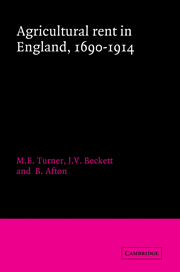Book contents
- Frontmatter
- Contents
- List of figures
- List of tables
- Preface
- Note on the text
- List of abbreviations
- Two examples of contemporary rent books
- Introduction
- 1 Agricultural rent in England
- 2 Contemporary views of rent in eighteenth and nineteenth-century England
- 3 The current state of knowledge
- 4 The determining parameters of a rent index
- 5 Constructing the rent index I: estate records
- 6 Constructing the rent index II: government inquiries
- 7 Constructing the rent index III: other studies
- 8 An English agricultural rent index, 1690–1914
- 9 Rent arrears and regional variations
- 10 The rent index and agricultural history I: the long term
- 11 The rent index and agricultural history II: the short term
- Conclusion
- Appendix 1 Sources of the rent index
- Appendix 2 Statistical summary
- Bibliography
- Index
1 - Agricultural rent in England
Published online by Cambridge University Press: 02 December 2009
- Frontmatter
- Contents
- List of figures
- List of tables
- Preface
- Note on the text
- List of abbreviations
- Two examples of contemporary rent books
- Introduction
- 1 Agricultural rent in England
- 2 Contemporary views of rent in eighteenth and nineteenth-century England
- 3 The current state of knowledge
- 4 The determining parameters of a rent index
- 5 Constructing the rent index I: estate records
- 6 Constructing the rent index II: government inquiries
- 7 Constructing the rent index III: other studies
- 8 An English agricultural rent index, 1690–1914
- 9 Rent arrears and regional variations
- 10 The rent index and agricultural history I: the long term
- 11 The rent index and agricultural history II: the short term
- Conclusion
- Appendix 1 Sources of the rent index
- Appendix 2 Statistical summary
- Bibliography
- Index
Summary
The payment of rent, usually due on Lady Day (25 March) and Michaelmas (29 September) but sometimes also on the other quarter days (25 December and 24 June), was one of the high, or low lights, of every farmer's life. If he had the cash to pay, he could sit back and enjoy the rent dinner and accompanying festivities with peace of mind. If, by contrast, he had to approach the landlord or his agent with the sad news that he could not pay, or at least could not pay now, or could not pay the whole rent, he must have viewed rent day with apprehension. Yet one way and another, year in and year out, millions of pounds changed hands in agricultural rents of one sort or another. It was perhaps the most substantial transfer of resources from one social group – the tenant farmers – to another – the landlords – before the advent of industry and banking in the course of the industrial revolution; and it must have been one of the most discussed and debated issues in rural society: who could afford to pay; who was not paying; who seemed likely to quit their farm at rent day because they could not pay. These and many similar thoughts dominated conversation in village pubs throughout the length and breadth of the land, just as the problems behind them dominate the correspondence between landowners and their agents or stewards.
The business of paying the rent was a matter for landlord, agent, and tenant, but the importance of rent as a guide to the financial health of the community and the nation is undeniable.
- Type
- Chapter
- Information
- Agricultural Rent in England, 1690–1914 , pp. 6 - 36Publisher: Cambridge University PressPrint publication year: 1997
- 2
- Cited by



